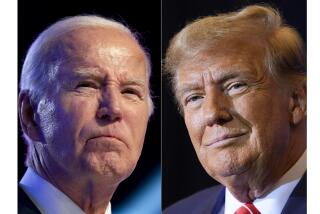Rick Perry’s surge may force Mitt Romney to shift gears
- Share via
Reporting from Washington — Former Massachusetts Gov. Mitt Romney may be forced to shake up his strategy to win the Republican presidential nomination now that Texas Gov. Rick Perry has seized the top spot in the latest Gallup poll.
Among Romney’s likely shifts: softening his focus on New Hampshire, the first primary state, and starting a more aggressive campaign in Iowa, where the race actually begins.
Romney invested heavily there in 2008 and fell short. But this time, a battle between Perry and Rep. Michele Bachmann of Minnesota for supremacy among Iowa’s social conservatives could create an opening for his more moderate brand of conservatism.
Also up for discussion inside the Romney camp: an accelerated advertising push, including attack ads against Perry.
“This nomination fight will not be a coronation,” said Scott Reed, a GOP strategist who is neutral in the race. “He’s got to show that he’s willing to fight for it.”
Romney has the most seasoned and well-developed organization of any GOP candidate, and a big money advantage. But he has failed to generate widespread enthusiasm among primary voters. As last week’s Gallup poll showed, the support he built over the last three months has disappeared, along with his lead.
Among Republicans and Republican-leaning independents, 29% said they preferred Perry as the nominee to take on President Obama, and 17% preferred Romney.
Shrugging off questions about Perry’s surge, Romney told reporters last week that there would be no change in his determination to focus on Obama rather than on other Republicans.
“My campaign approach remains exactly the same,” he said.
But Perry’s progress could make it more difficult for Romney to raise money in an already challenging environment for GOP presidential candidates. A significant number of Republican “bundlers” — heavy hitters who can sweep up big contributions from their personal networks — remain on the sidelines, waiting to see how the race develops and who will be the likely nominee.
According to the Gallup survey, Perry built a double-digit advantage over Romney by drawing broad support across GOP subgroups. An ability to bridge the party divide between social conservative hard-liners and more moderate conservatives is considered key to winning the nomination.
“When he launched his campaign, he talked about how proud he was to be a conservative and how he governed as a conservative in Texas,” Reed said. “And that’s why he grabbed the conservative movement’s attention, which is reflected in these polls.”
Unlike past front-runners, Romney has veered away from the defend-every-state strategy. Instead, he’s husbanding his resources and confining his campaigning largely to New Hampshire, a state highly favorable to him for reasons of geography and ideology. Since formally entering the race last spring, he has made more public appearances there than in the other 49 states combined.
That cautious plan, designed to minimize errors and ward off an upset in a state that is notoriously hard on front-runners, has won praise from GOP strategists, who saw it as a sign of Romney’s discipline and lessons learned in his first presidential campaign.
But it also allowed other, more active rivals to grab more national attention, and it may be a factor in his slide in the polls. When the independent Pew Research Center asked Republicans which candidate they had heard the most about recently, 30% mentioned Perry and 23% answered Bachmann. Only 12% said Romney.
The Romney camp had hoped the race would develop slowly, with a prolonged competition among conservative candidates before an “anti-Romney” challenger emerged after the first round of primaries. But if Perry’s swift rise continues, 2012 could quickly become a one-on-one affair.
Before shifting strategy, Romney advisors want to see whether Perry’s popularity holds, or whether he’s merely the latest flavor of the month for a restless GOP electorate that’s already bestowed its favor on such unlikely contenders as businessman Donald Trump.
Staying the course is one reason Romney declined an invitation to a Columbia, S.C., issues forum staged by an influential “tea party” figure, Sen. Jim DeMint (R-S.C.). Five conservative candidates, including Perry, will take part in the Labor Day event.
Romney will be in New Hampshire preparing for a major economic speech the next day, designed as his alternative to one that Obama will deliver soon. But hedging his bets, Romney also plans a makeup campaign visit to South Carolina next month, his first trip to the first Southern primary state since he formally entered the race.
More to Read
Sign up for Essential California
The most important California stories and recommendations in your inbox every morning.
You may occasionally receive promotional content from the Los Angeles Times.










